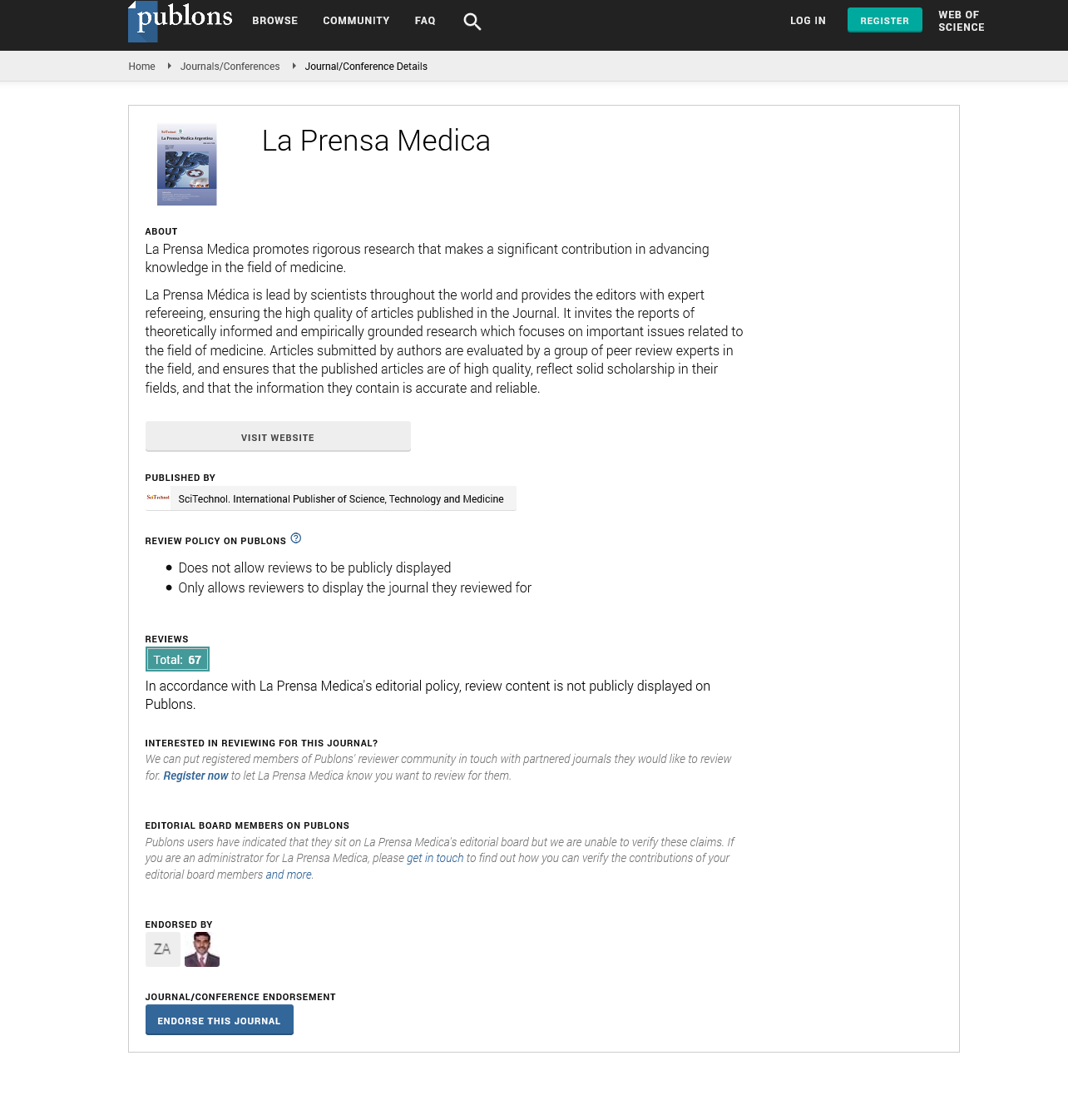Perspective, La Prensa Medica Vol: 109 Issue: 1
Exploring the Potential of HMG-CoA Reductase Inhibitors as Anti-Obesity Agents
Yu Zhang*
1Department of Cardiology, First Affiliated Hospital of Chongqing Medical University, Chongqing, China
*Corresponding Author:Yu Zhang,
Department of Cardiology, First Affiliated Hospital of
Chongqing Medical University, Chongqing, China
E-mail: weirto@hotmail.com
Received date: 28 March, 2023, Manuscript No. LPMA-23-100497;
Editor assigned date: 31 March, 2023, PreQC No. LPMA-23-100497(PQ);
Reviewed date: 14 April, 2023, QC No. LPMA-23-100497;
Revised date: 21 April, 2023, Manuscript No. LPMA-23-100497 (R);
Published date: 28 April, 2023, DOI: 10.4172/0032-745X.1000152
Citation: Zhang Y (2023) Exploring the Potential of HMG-CoA Reductase Inhibitors as Anti-Obesity Agents. La Prensa Medica 109:1.
Abstract
Description
Obesity has reached epidemic proportions globally, with significant implications for public health. Current treatment options for obesity often involve lifestyle modifications, diet interventions, and pharmacotherapy. In recent years, there has been growing interest in exploring the potential of HMG-CoA reductase inhibitors, commonly known as statins, as anti-obesity agents. This perspective article delves into the rationale behind considering statins for obesity treatment and discusses the emerging evidence and challenges associated with their use. Obesity and dyslipidemia, characterized by elevated levels of cholesterol and triglycerides, frequently coexist. It is well-established that obesity contributes to the development of dyslipidemia, leading to an increased risk of cardiovascular diseases. HMG-CoA reductase inhibitors are widely prescribed for their lipid-lowering effects, primarily targeting cholesterol reduction by inhibiting the enzyme involved in cholesterol synthesis.
This raises the question of whether these drugs could have additional benefits in combating obesity beyond their lipid-lowering effects. Emerging research suggests that HMG-CoA reductase inhibitors may possess mechanisms that extend beyond cholesterol reduction. Preclinical studies have shown that statins can modulate adipocyte differentiation and function, potentially influencing body weight regulation. They have been found to affect adipokine secretion, insulin sensitivity, and inflammation, all of which play vital roles in obesity development and progression. These pleiotropic effects have sparked interest in investigating statins as anti-obesity agents. Several observational studies have explored the relationship between statin use and body weight in large patient populations. While some studies suggest a modest reduction in body weight and Body Mass Index (BMI) with long-term statin use, the findings remain inconclusive and contradictory. Additionally, randomized controlled trials specifically designed to evaluate the effects of statins on weight reduction in obese individuals are limited. Further well-designed clinical trials are needed to establish the efficacy and safety of statins as anti-obesity agents. Given the multifactorial nature of obesity, a combination therapy approach may hold chance. Statins, when used in conjunction with other anti-obesity medications or lifestyle modifications, could potentially enhance treatment outcomes. Additionally, personalized medicine approaches, considering individual genetic and metabolic profiles, may help identify patients who are more likely to benefit from statin therapy for weight management. The use of statins as antiobesity agents is not without challenges. Safety concerns, such as the risk of adverse effects associated with long-term statin use, need careful consideration. Additionally, the potential variability in response to statins among individuals necessitates the development of predictive markers to identify patients who are likely to respond favorably. Furthermore, the cost-effectiveness of utilizing statins specifically for obesity management requires evaluation.
Discusing the potential of HMG-CoA reductase inhibitors as antiobesity agents represents a novel approach in the battle against obesity. Beyond their well-established lipid-lowering effects, statins possess intriguing pleiotropic properties that may influence body weight regulation. However, conclusive clinical evidence supporting the efficacy and safety of statins as anti-obesity agents is currently lacking. Rigorous clinical trials, combination therapy approaches, and personalized medicine strategies are essential for further exploring their potential in obesity management. As the obesity epidemic continues to pose a significant global health challenge, the investigation of new therapeutic avenues, including repurposing existing medications like statins, holds chance for improving obesity treatment outcomes.
 Spanish
Spanish  Chinese
Chinese  Russian
Russian  German
German  French
French  Japanese
Japanese  Portuguese
Portuguese  Hindi
Hindi 

